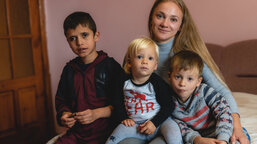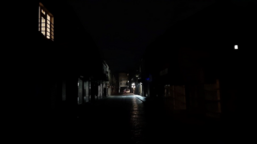How does everyday life look like in war-torn Ukraine? What do people in the west of the country face? How are they affected by the constant power outages? Read the diary of our colleague Kateřina Krejčová, who regularly writes from Mukachevo her observations of life in Ukraine. The second part of her diary is here.
Air Alert
It's lightly drizzling outside, people are walking around generators humming on the sidewalks. My colleague Yana explains that not all the ATMs in the city are working and that she'll have to withdraw cash too, as news of planned Russian attacks on the Ukrainian banking system is spreading through the Telegram channels, causing increased interest in its services. I have not been able to verify this report anywhere, but regardless of whether it is true or not, there are already crowds of people standing in the passage by the ATM. However, it is not possible to enter the bank building and carry out more complex operations in addition to withdrawals. Employees shut the door sternly in everyone's face and throw their hands out towards a sheet of paper in transparent office folders taped with duct tape that reads, “AIR ALERT."
We automatically reach for our cell phones and check the "Tryvoha" ("Alert") app: the entire map of Ukraine is now red, even Crimea. So it means that after a few days of calm, another attack is coming, threatening all areas of the country. It flashes through my head that I should be more attentive and switch to "orange" mode on my internal traffic light, but my brain is too slow to recapitulate the state of readiness by reciting the list: evacuation luggage, canned food supplies, 30 liters of utility water stacked in the bathroom, 15 liters of drinking water in the kitchen, charged phone, charged solar power bank, documents, headlamp. "But nothing will fall here. They won't get here!" ring in my ears the words of our youngest local colleague, Daniel, just 19, who recently asked me carefully and seriously, "Do you go to church? I go to church."
VIDEO: Attacks on infrastructure cause constant blackouts. Generator on the street in Mukachevo.
My colleagues, Yana, the assistant, and Taras, the architect, continue to scroll with their phones in their hands, and within seconds they know everything about the rockets. I feel a slight nervousness, not out of fear of the missiles, but out of fear that I will miss something important, that I will misunderstand something, that I will not notice something, that, as so many times before, I will not understand Ukraine through my Czech glasses. I ask Yana and Taras what channels I should watch on Telegram. We eat the same food, we drink the same uzvar, now we will watch the same channels.
Heroes
The alarm lasts exactly one hour and eleven minutes. Locals from Mukachevo don't go to shelters. Taras has already stopped watching the Telegram channels and is now checking how the work is progressing at our locations, where workers are building modular houses for people who have fled here from the east of Ukraine: from liberated Kherson, Izjum, Kharkiv, Luhansk and Donetsk regions. Displaced people from these areas are more likely to go to the shelters, even if it is the westernmost point of Ukraine. When the alert is over, Taras will go to one of the locations. He had to get a generator for it a few weeks ago because power outages made it impossible to continue with construction.
I admire the calmness with which Taras reacts to air raid alerts because, as well as causing anxiety, they mean that the chain of carefully planned construction work is always unexpectedly interrupted, that nothing can be properly planned. He telephones one of the workers to make sure he has managed to buy glue before the hypermarket, in response to the air raid alert, like the bank earlier, slams the glass door in everyone's face. Even those who desperately need to buy materials to build emergency accommodation for people who we classify as extremely vulnerable according to our internal guidelines. (Note: The mobile homes have already been built, and the most vulnerable people are now being selected to move in within a few days.)
Our phones are alerting us that the air raid alert is over, and in addition to the alarm, messages from our colleagues at the Prague headquarters are now starting to pop up on our mobile phones. Our lunch break is over with the alarm. Slowly, it's like we're waking up. Taras notes that in the mountain locality of Svaljava, so popular with hikers in times of peace, today it has snowed up to the knees and it is freezing cold, but it is better than if it rained. Luckily the boys managed to buy the glue before the alarm. "Molodci," I repeat after Taras, as if in Ukrainian class, a word that translates as "fighters", "heroes". Mo-lod-ci.
VIDEO: The construction of modular houses was complicated by power outages. But they were successfully built.
How is Caritas Czech Republic helping people in Ukraine
In the west of Ukraine, from where Kateřina Krejčová writes her diary, Caritas Czech Republic is helping also thanks to the generous help of donors who have contributed to the Caritas for Ukraine collection.
The Russian invasion has driven millions of people from their homes, many of whom have found safe haven in the west of the country. But these regions did not have sufficient facilities for so many people, and many had to be housed in gymnasiums and halls. Caritas Czech Republic built modular houses in the west of the country for Ukrainians who had lost the roof over their heads. At the same time, we renovated mass accommodation facilities to ensure decent living conditions. We provided financial support to people fleeing the war to buy basic necessities.
We are also providing psychological assistance to Ukrainians in the west of the country. In cooperation with the Fire and Rescue Corps of the Czech Republic, we have trained local psychologists in providing psychological care in crisis situations.










